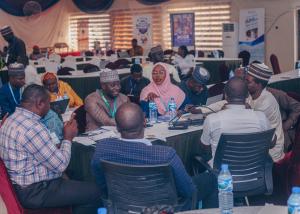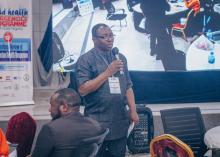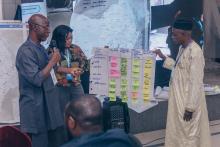WHO scales up emergency response to reach displaced vulnerable populations in north-east Nigeria
Maiduguri, 15 February, 2023 - Raising from the recently concluded 12th Joint Operations Review (JOR) on humanitarian support in the northeast, the World Health Organization (WHO) is widening its emergency health response to reach displaced vulnerable populations in the region.
Already, the agency leads international action to expand universal health coverage and coordinates health emergency responses globally.
In Borno, Adamawa and Yobe states (BAY), WHO has been supporting the government of Nigeria to resolve health challenges, stemming from the humanitarian crisis in the region.
The JOR is a biannual evaluation of the health emergency response programmes in the BAY states since WHO declared the humanitarian situation in the northeast at grade 3, owing to its gravity and impact on public health that put intense pressure on healthcare services in the affected communities.
At the end of the 12th JOR meeting (6-8 February), WHO maintained its resolution per the General Programme of Work GWP 13 target to expand humanitarian aid to displaced persons in the BAY states.
Delivering the closing remark, WHO Dakar Hub Health Emergency Officer, Dr Ernest Dabire, notes that the JOR is necessary to map out a clear vision of the health needs in the BAY states.
Dr Dabire, representing WHO Country Representative, Dr Walter Kazadi Mulombo, says WHO will continue to provide leadership in the health sector to enable the states to reach vulnerable populations with the needed health services as per the GWP 13 goals.
“WHO remains committed to providing essential health services to high-risk displaced persons in the region. We are immensely grateful to humanitarian donors, including the United States Agency for International Development (USAID), the European Civil Protection and Humanitarian Aid Operations (ECHO), the government of Germany, the Nigerian Humanitarian Fund (NHF)and the Contingency Emergencies Response Fund (CERF), for supporting the WHO with its HEALTH FOR ALL mandate,” he adds.
Dr Dabire further says that the resolutions from the JOR will align with recommendations from the Lake Chad conference, especially the stabilization strategy developed to better support the states in addressing the growing humanitarian needs.
Meanwhile, the participants commended WHO, local and international partners, for supporting the BAY states in providing quality health interventions to at-risk populations in the region.
Appreciating WHO for its support, the Director of Medical Services, Dr Ibrahim Mohammed Ngulde, representing the governor of Borno state, says the exercise (12th JOR meeting) is very important to ensure effective and coordinated humanitarian intervention in the region.
We are optimistic that implementing the recommendations from the 12th JOR meeting will strengthen the health systems to provide quality health intervention to those needing it.”
Some of the recommendations during the meeting include, but are not limited to, supporting the development of a state multi-hazard disaster preparedness and response plan, conducting Health Resources and Services Availability Monitoring System (HeRAMS) assessment to map critical strengths and gaps in health resources, and strengthening community activities at the LGA borders.
The resolution from the meeting stemmed from concerns about the dwindling resources/ humanitarian funds from national and international quarters.
The participants noted that the diminishing humanitarian funding continues to interfere with the aid from partners to improve the capacity of the health workforce to respond to health emergencies in the BAY states.
Additionally, there was apprehension about the negative impact of reoccurring epidemic-prone diseases on the health of displaced populations.
The 12th JOR consultation and review brought-in public health experts from WHOs 3-level (Headquarters, the African Region, and the Country Office, Nigeria), program officers, health sector partners, and key government officials from the BAY states.
The activity is WHOs core internal strategy to review its health emergency programmes in north-east Nigeria to improve current standards and develop the roadmap for future interventions.
Technical contact:
Dr Muraguri Beatrice bmuraguri [at] who.int (bmuraguri[at]who[dot]int)





